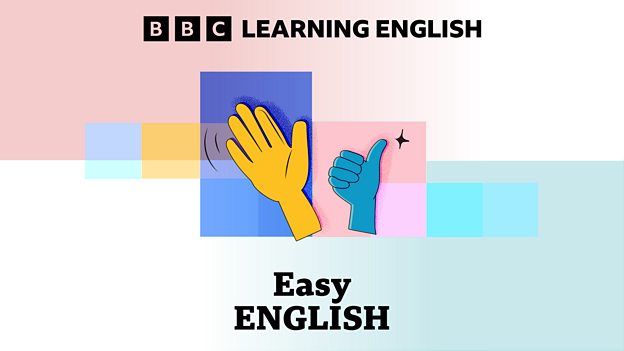6 Minute English
Intermediate level
What is the future of work?
Episode 240201 / 01 Feb 2024

Introduction
Should we be worried about our jobs disappearing? Or is the future positive? Neil and Beth discuss this and teach you some useful vocabulary.
This week's question
After Covid, many British companies gave the idea a go, but out of the sixty companies taking part in a four-day working week trial in 2023, how many said they planned to continue with a shorter work week?
a) 52%?
b) 72%? or,
c) 92%?
Listen to the programme to hear the answer.
Vocabulary
take (something) with a pinch of salt
not completely believe something you are told because you think it’s unlikely to be true
track record
the achievements or failures of someone’s past performance
come to pass
(old fashioned) take place, happen
dystopian
person who imagines or foresees a dystopian future where there is great suffering and injustice in society
get rid of
to remove something that you do not want any longer
crop up
appear or happen unexpectedly
TRANSCRIPT
Note: This is not a word-for-word transcript.
Neil
Hello. This is 6 Minute English from BBC Learning English. I’m Neil.
Beth
And I’m Beth. Smell-o-vision, a television which allows you to smell things as well as see them; and a miracle pill which cures all diseases. These predictions for the future were made in the 1930s, but so far they haven’t come true.
Neil
Making predictions for the future isn’t easy – just ask tech billionaire, Elon Musk, who recently predicted that artificial intelligence will eventually mean that no one will have to work. In fact, there have been many predictions about the future of work, for example that robots will take over most jobs, and that everyone will work from home.
Beth
During Covid, one of these predictions came true. Millions were forced to work from home. So what will work be like in the future? That’s what we'll be discussing in this programme and, as usual, we'll be learning some useful new vocabulary too.
Neil
But first I have a question for you, Beth. Another idea for the future is the 'four-day working week' where employees work four days for the same money as five. After Covid, many British companies gave the idea a go, but out of the sixty companies taking part in a four-day working week trial in 2023, how many said they planned to continue with a shorter work week?
Was it:
a) 52%?
b) 72%? or,
c) 92%?
Beth
Hmm, I guess 52% of the companies plan to continue with a four-day week.
Neil
OK, Beth, I’ll reveal the answer later in the programme. Now, whatever Elon Musk thinks, as we’ve seen, it’s difficult to make your predictions accurate. Here’s Shaun Ley, presenter of BBC World Service programme, The Real Story, asking University of Cambridge professor, Brendan Burchell, what he thinks about predictions for the future of work:
Shaun Ley
Brendan Burchell, when you look at all the predictions that have been made, certainly in your working lifetime, do you take some of the things that are being predicted now with a large pinch of salt?
Prof Brendan Burchell
I do. I think we have to be sceptical. I think the track record for economists and other social scientists isn't good when we look… you know, for hundreds of years, a hundred years now, people have been predicting that they'll be really quite dramatic reductions in working time, like Elon Musk has just made, and previously those predictions - although we're heading very gradually in that direction - those predictions of very, very large changes in working time just haven't come to pass.
Beth
Shaun asks if we should take predictions with a pinch of salt. To take something with a pinch of salt is an idiom meaning to doubt that what you've been told is accurate or likely to come true. For example, if your friend always lies, you take what they say with a pinch of salt.
Neil
Professor Burchell thinks predictions for the future of work have a bad track record. A track record means all the achievements or failures that someone has had in the past. When it comes to predicting the future of work, most predictions simply haven’t come to pass, an old-fashioned way of saying ‘happened’ or ‘come true’.
Beth
So, are predictions for a future of leisure, relaxing by the pool while robots do all the work, just a dream? Let’s hear from Andrew Palmer, business editor for The Economist magazine, talking to BBC World Service programme, The Real Story:
Andrew Palmer
I'm not a tech dystopian, I don't think that machines or AI are going to get rid of all jobs, but I do worry about a sequencing risk. So, there will be some disruption from AI. Some jobs, some professions are at risk. And, although economists like to say new jobs will crop up, they won't necessarily be aligned at the same time – there won't be coordination.
Neil
Andrew is not a dystopian, someone who imagines a nightmarish future of suffering and injustice. He doesn’t think AI will get rid of all jobs. To get rid of something means to remove it because you no longer want it.
Beth
Andrew predicts that AI will replace some jobs and those workers will need support, but he also thinks new jobs will crop up, they will appear unexpectedly. And that’s exactly the problem – the future is hard to predict because it’s so unexpected! Anyway, I reckon a shorter working week is something we can all agree on right, Neil?
Neil
Absolutely. I think it’s time to reveal the answer to my question about the sixty companies trying out a shorter working week in 2023. I asked how many of them planned to continue a four-day week at the end of the trials.
Beth
I guessed 52%. So, was I right?
Neil
That was… the wrong answer, I’m afraid, Beth! Actually, a whopping 92% of the companies plan on keeping a four-day week because it was so popular, with bosses as well as workers! Right, let's recap the vocabulary we've learned from this programme starting with the idiom take it with a pinch of salt, meaning don’t completely believe that what you are told is true.
Beth
A track record means the achievements or failures of someone’s past performance.
Neil
To come to pass is an old-fashioned way of saying to take place or happen.
Beth
A dystopian is someone who foresees a nightmarish future where there is great suffering and injustice in society.
Neil
If you get rid of something, you remove something that you no longer want.
Beth
And finally, if something crops up, it appears or happens unexpectedly. Once again our six minutes are up! Join us again soon for more trending topics and useful vocabulary, here at 6 Minute English. Goodbye for now!
Neil
Bye!
Latest 6 Minute English

Embarrassed to go to the doctor?
Episode 241226 / 26 Dec 2024
Have you ever been embarrassed to go to the doctor?

Call centres: Are you talking to AI?
Episode 241219 / 19 Dec 2024
Have you ever phoned up a company and had your call held in a queue? Could AI make this less painful?

Making 'mum friends'
Episode 241212 / 12 Dec 2024
Is making new ‘mum friends’ the positive experience it’s often described as?

Can you trust ancestry DNA kits?
Episode 241205 / 05 Dec 2024
Are DNA ancestry tests a reliable way to trace your ancestry?

How babies learn to talk
Episode 241128 / 28 Nov 2024
What do babies need to learn to do to be able to talk?


The bond between sisters
Episode 241114 / 14 Nov 2024
Are the stereotypes about older and younger sisters true?


Why you need a good night's sleep
Episode 241031 / 31 Oct 2024
Why is it so important to get a good night's sleep?

Divorce: Why does it happen?
Episode 241024 / 24 Oct 2024
How is divorce talked about in different countries?


Did Taylor Swift fans cause an earthquake?
Episode 241010 / 10 Oct 2024
Did Taylor Swift move the Earth?


Learning a new food culture
Episode 240926 / 26 Sep 2024
Would you find it different to adapt to a new food culture?

Saving water in the driest place on Earth
Episode 240919 / 19 Sep 2024
How do farmers in the driest place on Earth manage to grow crops? With this solution!



Chocolate: Meet a real Willy Wonka
Episode 240829 / 29 Aug 2024
Would you like to be a chocolate maker, like Roald Dahl's Willy Wonka?

Why we love dumplings
Episode 240822 / 22 Aug 2024
Warning! This episode might make you very hungry...

Kids and climate change
Episode 240815 / 15 Aug 2024
What are young people's thoughts on climate change?


The science of falling in love
Episode 240801 / 01 Aug 2024
What's really happening in our brain when we fall in love?

AI to reduce animal testing
Episode 240718 / 18 Jul 2024
Could AI reduce the need for animal testing?

Why read books, not screens?
Episode 240718 / 25 Jul 2024
Why is it better to read from a book than a screen?

The school that puts the kids in charge
Episode 240711 / 11 Jul 2024
What happens when you put the kids in charge of the school?

What can we learn from toddlers?
Episode 240704 / 04 Jul 2024
Learn to speak to yourself in the way that toddlers do!

How learning to read changes lives
Episode 240627 / 27 Jun 2024
How can literacy change people's lives?

Building a better world with wood?
Episode 240620 / 20 Jun 2024
How can buildings made from wood help our mental health?

How names can tell painful stories
Episode 240613 / 13 Jun 2024
Could our name have painful baggage?

E-rickshaws driving away pollution
Episode 240606 / 06 Jun 2024
Could E-rickshaws give us cleaner air?




Bitter food, better health?
Episode 240509 / 09 May 2024
Could bitter foods be better for your health?







Disability in music and theatre
Episode 240321 / 21 Mar 2024
Learn about the people who are making it easier for disabled musicians and music fans to perform and see live music


Sewing to fight period poverty
Episode 240307 / 07 Mar 2024
Period poverty affects over 500 million people worldwide. How can a volunteer project help?

Plastic waste eaten by enzymes
Episode 240229 / 29 Feb 2024
Plastics can be difficult to recycle. Could a recently discovered enzyme help?

Feed your brain
Episode 240222 / 22 Feb 2024
Food is fuel for our brains. So, what should we be eating?

Food for new mums
Episode 240215 / 15 Feb 2024
Having a baby is exhausting! What do mothers need to eat after giving birth?

Fighting loneliness with soup
Episode 240208 / 08 Feb 2024
Hear how a project in the Netherlands is helping in the fight against loneliness


How the language of menus matters
Episode 240125 / 25 Jan 2024
Why is the language used on menus important?










